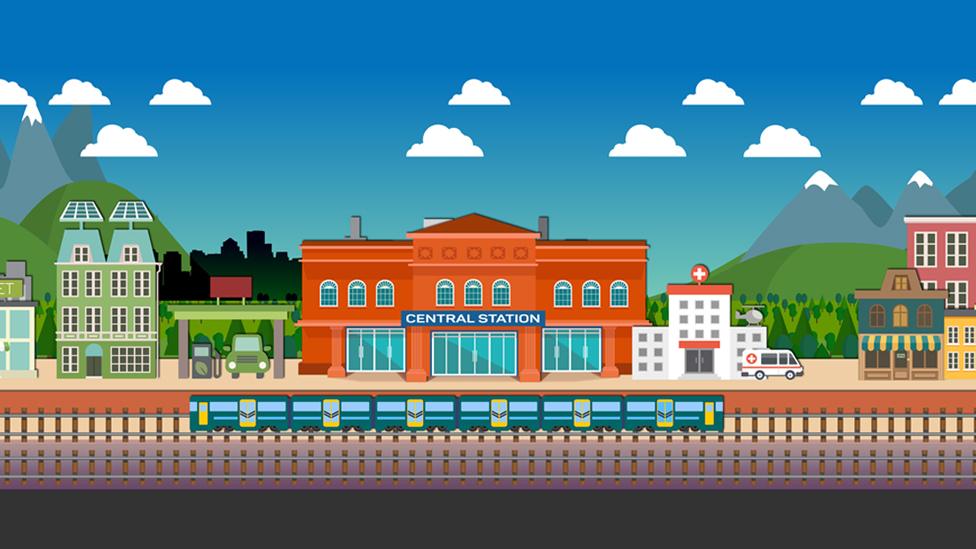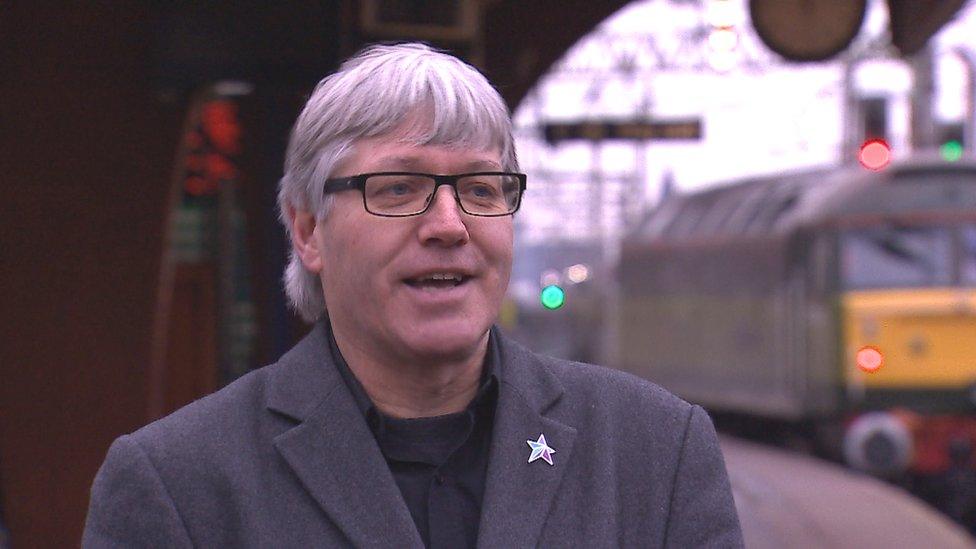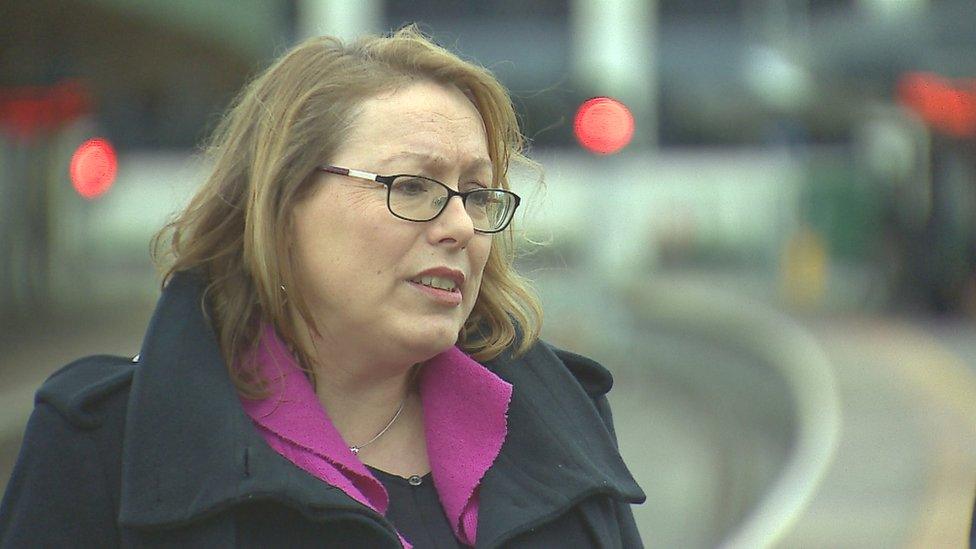What's wrong with Wales' trains?
- Published

Wales has train trouble.
So how did we get here? And is there light at the end of the tunnel?
The BBC Wales news website sat down with Nick Servini - presenter of this week's Week In Week Out programme which examined the issues in detail - in search of some answers.
You can watch the full programme here on the iPlayer

So what exactly is the problem with trains in Wales?
They are old, they cost a lot to maintain, there are not enough of them and passenger over-crowding has reached record levels. All that is leading to disruption at certain times on some services
Passenger numbers are on the up - they've risen from 18 million in 2003 when Arriva Train Wales (ATW) first started running our trains, to 30 million currently.
But Arriva Trains Wales, who run the Wales and Borders franchise, have a zero growth contract - which means they are stuck with the same number of trains they had in 2003.
Trains in Wales - some facts
People rely on trains to get to work so Arriva is the first to be blamed when things go wrong. And over the past couple of months, they've been fielding a torrent of complaints.
Quite often there are only two carriages on trains, they fill up quickly so people further down the line towards city centres can't board and have to wait for a later services which frequently makes them late.
Some feel a poor train service is holding back our local economies.

That's not good. Time to modernise?
Yes, indeed. Arriva needs new trains that don't need constant maintenance; trains like those being assembled at one of the largest train manufactures Bombardier in Derby.
There have been inquiries from Wales but no trains will be ordered from anywhere until it's clear which company wins the new franchise to run our trains which is up for grabs in 2018. There's also the question of whether our trains will be diesel, electric, hybrids or something else.

But compared to the rest of the UK, we're doing ok aren't we?
Depends how you look at it. Of course over-crowding on the railways is not unique to Wales - a busy city like Manchester is a case in point.
According to the latest Department of Transport figures for 2015, over-crowding rates for Manchester are higher than in Cardiff.
But the problem is the rates are falling in Manchester whereas in Cardiff the number of people on the morning commute is rising - and rising at a faster rate than anywhere else in the UK outside London.
And that increase was recorded before ATW admitted that over-crowding on its services had reached its highest level in recent years.
So we're back to that basic problem again - Arriva's contract means it is trying to deal with the extra demand, with the same number of trains they had back in 2003.

Ok, so there's a lack of trains. The solution is simple - buy some more and add on a few more carriages to existing ones?
That's difficult due to the contract under which ATW runs the trains. It's a zero growth contract.
Rail industry expert Tony Miles explains: "You are locked into the number of trains you'd got at the beginning over a long contract. That is the problem.

Railway journalist and commentator Tony Miles
"How do you predict what's going to happen in 15 years' time? And get it right? On a long contract like 15 years, we didn't know people would be abandoning their cars and saying I'd prefer to commute on public transport.
"That's one of the flaws in the way it was done. Lovely to have everything nice and secure and signed off but it gave no flexibility."
It doesn't help pressure that trains in Wales are some of the oldest stock in Europe - our oldest train has done 4.5m miles. And the average age of Arriva Trains Wales rolling stock is 27 years, with the oldest being 40 years.

So you're telling me ATW's contract continues until 2018 and it can't be changed which includes adding any more trains to existing stock. But is it really as black and white as all that?
Not exactly. There have been changes. For instance, Ebbw Vale's station didn't exist when ATW took over the franchise in 2003.
But the new line was built and services began in 2008 and thanks to money from the Welsh Government, three additional trains were leased to take passengers up and down to Cardiff.
So it seems where there's a will - and money - you can agree to run more trains and more services, above and beyond any franchise agreement.
And that's not the only example. Two years ago a new train was introduced to run from Holyhead to Manchester thanks to extra cash from the UK Government.
A north-south Wales service and extra capacity on some valley lines have been added too thanks to Welsh Government money.

You say passenger numbers are shooting up. Surely all the additional fares from those passengers could help fund extra trains?
The way we run our railways is full of surprises. A big one for me is that the Welsh rail services are among the most heavily subsidised in the UK.
Arriva is paid anything from £110m to £160m through their contract every year to run trains in Wales - that's because while some routes make money from fares many others are carrying what's referred to in the industry as "thin air".

Ok, so in the meantime why doesn't Arriva lease some more existing, second-hand trains?
Er… once again not quite that simple. I asked Simon Hughes, ATW's director of engineering the same question and he said they'd love to get more trains but they're unable to get the right kind at the moment although they're going to keep on trying.
It is true that the UK's three big rolling stock companies don't have the trains Arriva wants.
But then rail expert Tony Miles says there are smaller companies with rolling stock that could be used in Wales.

Lynne Milligan, ATW director of customer services
He says some are available to railway companies to use on a daily services , but he says as they use a locomotive to pull them they are very expensive to use as charges are levied on ATW by Network Rail who are responsible for the railway tracks.
ATW's director of customer services Lynne Milligan says it's not an ideal solution.

What about the Welsh Assembly Government - where does it stand in all this?
I asked Welsh Government minister Ken Skates what he thought...
Ken Skates talks about what is wrong with Wales' trains
And to press that message home further, he added: "Because a franchise was a failed franchise. And a franchise that is not fit for purpose, it has not obligated the operator to go out to seek additional rolling stock that we would wish to use."

How about ATW - one of the heaviest subsidised franchises in the UK - using some of its profits to tackle overcrowding?
ATW says it operates about 20% more than is contractual so they feel they've made a commitment to this business. the company also points out that they've invested well over £30m in a whole series of customer enhancements and this year alone are going to invest a further £2.5m despite fact that in 18 months' time they could well be walking away from it.
But Ken Skates thinks ATW's 6.9% profits are too high and says the company should be investing more in the service.
ATW is quick to point out that 10 years ago government subsidy made up 55% of its income and now makes up 40% as that subsidy declines every year.
Regardless of the arguments, in 18 months' time there will be a new franchise.
Whoever is successful, drawing up the right contract is going to be essential.
As for solving the current overcrowding? That seems to have descended into a blame game with the commuters stuck in the middle.
The latest Passenger Satisfaction Survey which looks at issues from ticketing and toilets to staff availability and stations shows that Arriva's overall results are stable, but people's happiness with the actual trains has declined.
Meanwhile, ATW director of customer services Lynne Milligan says the company is doing its very best every day in difficult circumstances.
"I'd love to be able to say here's more trains, give everybody a seat on those services but just don't have it so for us the challenge is how do we make the best service we've got," she added.

Is it true that half the problems experienced by passengers are not the trains but the track?
The track is Network Rail's responsibility as well as things like cleaning leaves off the line and fixing broken signals etc.
Over Christmas they were major delays due to work being done Cardiff Central but the station's signalling control room Route managing director Andy Thomas believes the changes will deliver real benefits.
"The £300 million signalling system in Cardiff was the biggest signalling commissioned ever for the UK to date.
"It's designed to increase the number of trains to go through Cardiff - from 12 trains per hour to 16 trains per hour. And that resilience is important because that allows us, when things go wrong we can recover quickly to minimise the impact on passengers."

And what about Cardiff Central station itself?
The station is decades out of date and is just one example of what some say is an underinvestment in the Welsh rail network.
Ken Skates said that the amount being spent on the network in Wales has only been 1% on provision of the network improvements despite the fact that we have 6% of railway lines in Wales.
I asked Mr Skates if he was shouting loudly enough. He said he has but it's been met with resistance from the UK Government consistently. Undeterred he said they've been equally consistent in demands for fair share of network funding and for devolution of responsibility , externalso the Welsh Assembly Government can invest where necessary.
The UK Transport Secretary Chris Grayling declined to be interviewed. His Department highlighted their recent investments in signalling and electrification but say the provision and funding of the rail franchise in Wales is, yes you guessed it - the responsibility of the Welsh Government.
